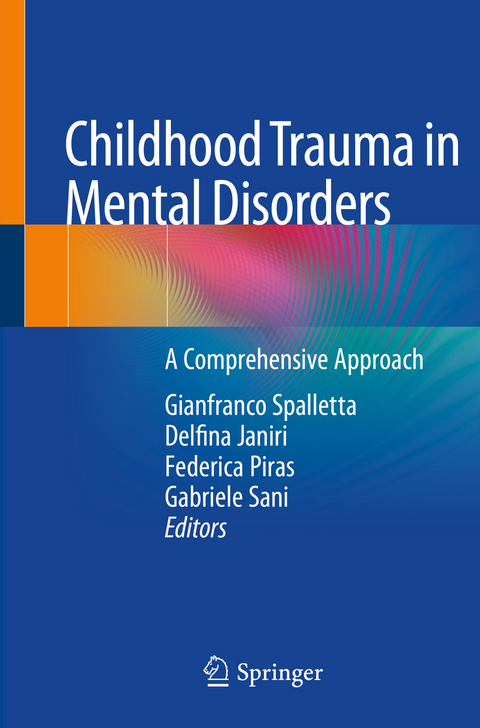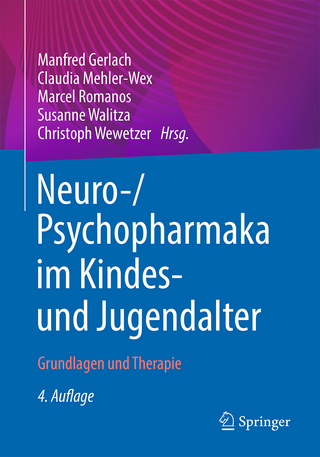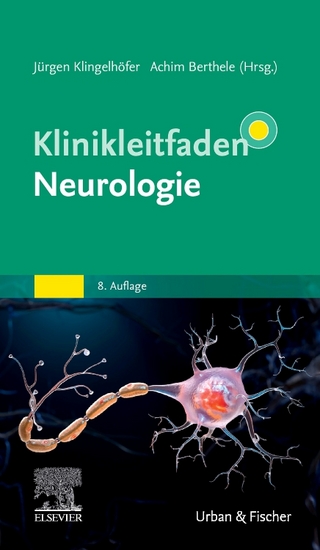
Childhood Trauma in Mental Disorders
Springer International Publishing (Verlag)
978-3-030-49416-2 (ISBN)
This volume presents a comprehensive overview of childhood trauma, considering the psychopathological definition and its neurobiological implications as well as its impact on different psychiatric disorders. The focus on childhood trauma rather than that occurring in adulthood is important due to its general "neuro-psyco-socio" and its specific biological implications, since trauma during childhood impacts directly on neurodevelopment. It has been suggested that early life stress increases vulnerability to psychiatric disorders; however, the exact mechanisms of this association are not yet completely understood. Although childhood trauma could be considered too unspecific to be an important risk factor for individual psychiatric disorders since it seems to occur across the board, it impacts differently on different psychiatric disorders, and it can modulate their clinical expression. Therefore, the assessment of early trauma needs to be included in the clinical evaluation of patients with psychiatric disorders. The volume will be an invaluable tool for psychiatrists, helping them to select suitable pharmacological, psychotherapeutic and rehabilitative treatments.
lt;p>
Gianfranco Spalletta is a psychiatrist and has a PhD in Neuropsychology. He is the head of the Laboratory of Neuropsychiatry and the clinical director of the Neuropsychiatric Outpatient Clinic and the Memory Clinic of the IRCCS Santa Lucia Foundation in Rome. He teaches Psychiatry at the speech therapy, the nursing and the international medical schools of the Tor Vergata University in Rome. In 2013 he was Visiting Professor at the Department of Psychiatry of the University of Iowa, and in 2014 at the Baylor College of Medicine, Houston, TX. In 2015 he was nominated Adjunct Associate Professor in the Menninger Department of Psychiatry & Behavioral Sciences at the Baylor College of Medicine of Houston, Texas, USA. He is the author of 300 manuscripts published in peer reviewed international journals and 10 book chapters (Psychiatry, Psychology, Neurology and Neuroscience fields). He edited the book Brain Morphometry of Springer Protocols. He has collaborations with Academic Departments in Iowa City, Houston, Dublin, Gottingen, Hannover, and Ülm. He is currently funded by the European Commission and the Italian Ministry of Health.
Delfina Janiri is a psychiatrist currently working at the Gemelli University Hospital in Rome, Italy (Fondazione Policlinico Universitario Agostino Gemelli IRCSS) and a PhD student at the Department of Psychiatry and Neurology of Sapienza University in Rome. In 2018 and 2019 she was research fellow in the lab of Professor Sophia Frangou at the Department of Psychiatry at the Icahn School of Medicine at Mount Sinai in New York, USA. In recognition of her research achievements, Dr Janiri was awarded the 2019 Samuel Gershon Junior Investigator Award by the International Society for Bipolar Disorders and was invited to join the editorial board of Bipolar Disorders. She also received the Research Prize of the European Psychiatry Association during their annual meeting in 2019. She is author or co-author of 28 international, peer-reviewed publications and a book chapter. Her research activity aims at improving our understanding of the core pathophysiological processes underlying risk, disease expression and resilience to mood disorders by integrating neuroimaging procedure with cognitive, genetic and developmental measures. She is particularly interested in investigating the relationship between clinical course and childhood traumatic experiences in mood disorders. Recently, she focused on brain alterations related to early traumatic experiences in patients with bipolar disorders. She is an active member of various Italian and International psychiatric associations and societies and member of the Editorial board of Bipolar Disorders and Frontiers in Psychiatry, section of Aging. She carries out clinical assistance activity since 2015 specifically focusing on pharmacological treatment, psychological and psychoeducational support to patients with bipolar disorders.
Federica Piras is a Research Fellow at the Fondazione Santa Lucia's Neuropsychiatry Laboratory, where she is responsible for neuropsychological test selection for cognitive impairment classification, and designing experimental research on psychiatric and neurodegenerative diseases. A speech pathologist (1989), experimental psychologist (2005) and Doctor of Philosophy in Cognitive Neuroscience (2009), her research interests span from the perception of temporal intervals (in healthy subjects and in psychiatric disorders) to neurocognitive rehabilitation and cognitive stimulation in brain-injured patients, and healthy and pathological aging. She completed her pre- and post-doctoral training at outstanding research facilities with world-renowned experts like Kia Nobre (the Brain & Cognition Lab, University of Oxford), Jennifer Coull (Laboratoire des Neurosciences Cognitives, Aix-Marseille Université) and Neils Birbaumer (Institute for Medical Psychology and Behavioural Neurobiology University Tübingen, winne
PART I. GENERAL Chapter 1. Introduction on Childhood Trauma in Mental Disorders, A Comprehensive Approach.- Chapter 2. The Concept of Childhood Trauma in Psychopathology: Definitions and Historical Perspectives.- PART II. NEUROBIOLOGY. Chapter 3. Neuroimaging and Cognition of Early Traumatic Experiences.- Chapter 4. Perinatal Mental Health and Childhood Trauma.- Chapter 5. Electroencephalography and Childhood Trauma.- Chapter 6. Interaction Between Genes and Childhood Trauma on the Outcome of Psychiatric Disorders.- Chapter 7. Childhood Trauma, Attachment Patterns, and Psychopathology: An Evolutionary Analysis.- PART III. NEUROPSYCHIATRIC DISORDERS. Chapter 8. Childhood Trauma in Bipolar Disorders.- Chapter 9. Childhood Trauma in Depressive Disorders.- Chapter 10. Childhood Trauma in Psychiatric Disorders: Childhood Trauma in Psychoses.- Chapter 11. PTSD During Childhood, Childhood Trauma, Childhood Maltreatment, and How They Relate to Adult PTSD.- Chapter 12. Childhood Trauma and Personality Disorder.- Chapter 13. Childhood Trauma in Psychiatric Disorders: Childhood Trauma and Substance Dependence.- Chapter 14. Childhood Trauma in Obsessive Compulsive Disorder.- Chapter 15. Childhood Trauma in Eating Disorders.- Chapter 16. Childhood Trauma and Dissociative Disorders.- Chapter 17. Trauma in Children with Neurodevelopmental Disorders: Autism, Intellectual Disability, and Attention-Deficit/Hyperactivity Disorder.- Chapter 18. Neurobiological Basis of Childhood Trauma and the Risk for Neurological Deficits Later in Life.- PART IV: SOCIAL AND THERAPEUTIC IMPLICATIONS. Chapter 19. Childhood Trauma and Stigma.- Chapter 20. Treatment of Childhood Trauma: Pharmacological Approach.- Chapter 21. Childhood Trauma related Interventions: Treatment at Different Stages Across the Lifespan.
| Erscheinungsdatum | 31.08.2021 |
|---|---|
| Zusatzinfo | VIII, 460 p. 26 illus., 20 illus. in color. |
| Verlagsort | Cham |
| Sprache | englisch |
| Maße | 155 x 235 mm |
| Gewicht | 712 g |
| Themenwelt | Medizin / Pharmazie ► Medizinische Fachgebiete ► Neurologie |
| Medizin / Pharmazie ► Medizinische Fachgebiete ► Psychiatrie / Psychotherapie | |
| Naturwissenschaften ► Biologie ► Humanbiologie | |
| Schlagworte | Anxiety Disorders • Bipolar Disorders • Eating Disorders • Mood Disorders • Neglect • neurodevelopment • Neuroplasticity • Physical Abuse • psychological abuse • Psychosis • PTSD • Schizophrenia • Sexual Abuse • Stress • Substance abuse and dependence • Treatment • vulnerability |
| ISBN-10 | 3-030-49416-0 / 3030494160 |
| ISBN-13 | 978-3-030-49416-2 / 9783030494162 |
| Zustand | Neuware |
| Haben Sie eine Frage zum Produkt? |
aus dem Bereich


